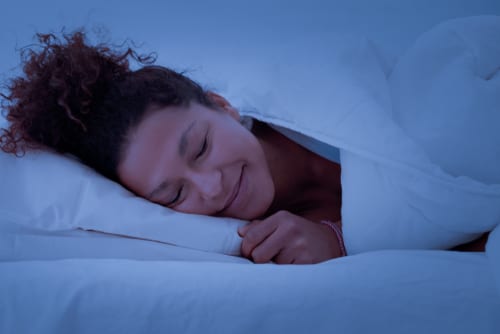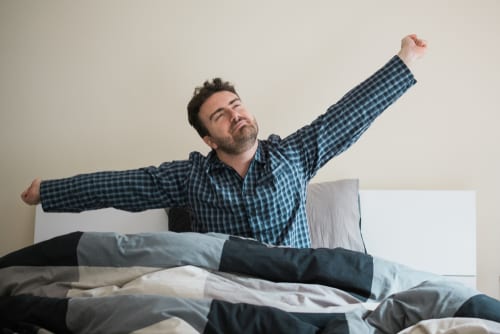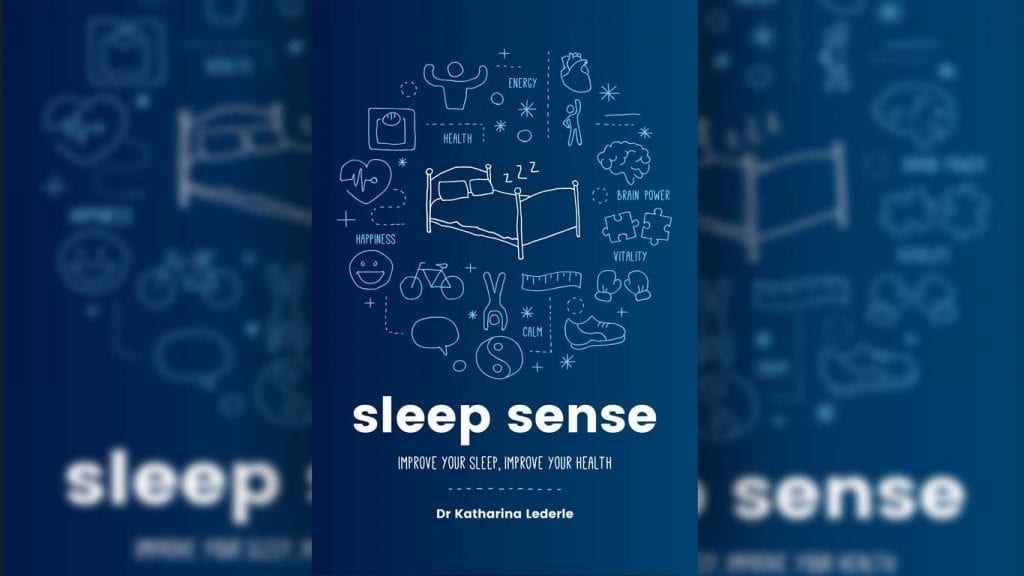Sleep - The Natural Therapy
We all know a lack of sleep affects our emotional wellbeing.
Not only does a lack of sleep often make us cranky, but a sleep deprived you could also be underpinning your emotional wellbeing, making you more susceptible to increased anxiety as you lose the ability to ignore relevant information.
On the flip-side, your emotional wellbeing can, of course, affect your sleep. Insomnia is often linked to anxiety and depression, with more than 80% of people with depression also suffering from insomnia.
So, how can you break the cycle of sleeplessness and allow peaceful sleep to return?
Of course, there is never just one reason your sleep may be disturbed, some factors we have absolutely no control over. Here, you will find general sleep habits to help you build your own scaffolding for a good nights sleep.
A SCAFFOLDING FOR
HEALTHY SLEEP
Healthy sleep habits start when you wake up in the morning. Remember, wake affects sleep and sleep affects wake.
You might find implementing these habits a struggle because of your current lifestyle, or maybe they simply don’t resonate with you. Feel free to adapt them so they fit your individual circumstances. There’s one thing I would ask you to keep in mind, though: are you making sleep a priority or are you letting other things take over? The more you appreciate sleep’s importance for your health and wellbeing, the easier you’ll find it to incorporate healthy sleep habits in your life naturally.
Your sleep environment
Make your bedroom comfortable 
Spend some time in ensuring your bedroom is comfortable for you so that you feel able to ‘breathe’ and you will look forward to being in the room! Cosy is one thing, but too much clutter can keep your mind engaged or focused and drain your energy. Tidy up and perhaps even redecorate a little to create a room that invites sleep.
Keep it dark
You don’t have to have blackout curtains, because as much as we want to avoid light in the evening and at night, we want the light in the morning to help us wake up.
Keep it quiet
This can be tricky if you live near a busy road or somewhere like an airport, or if you have noisy neighbours. Using earplugs can be helpful in these cases because the (noise) stressor is actually present. But as a general rule, try to fall asleep without them and only use them as and when needed to avoid becoming dependent on them.
Keep the room cool
Your body temperature naturally drops at night, which is important to get restful sleep. Keep your bedroom temperature between 16 and 18°C (60–65°F).
The right bed and bedding for you
Get a bed and mattress that you feel comfortable in and that don’t cause you any (extra) pain. Invest in good pillows and have summer and winter duvets that accommodate the change in temperature from season to season.
A healthy lifestyle: waking up
Setting the scene

When you wake up, take a moment to acknowledge the sleep you got. I don’t want you to get obsessive about the exact amount of sleep you had or fret about its quality. Simply reflect on your night and how your previous day influenced it. It’s a bit like keeping a mental sleep diary.
Then take a moment to consider the day ahead of you, your to-do list and expectations. Plan moments in the day when you will step back and take a mini-mindfulness break, acknowledging what you’re doing in that moment.
Practising mindfulness regularly helps you to better regulate your emotions and reduce levels of stress. You slow down and develop a more balanced state of wellbeing — a pace and state that is more aligned with sleep.
Keep your wake-up times regular
Make sure the time you wake up is regular — within a 30-minute time window. If you do stay up late one night on the weekend, get up the next day no later than 60 minutes after your normal wake-up time.
Getting out of bed
Once you’re out of bed, open the curtains and let light in to help your body wake up and to ensure your internal clock stays synchronized.
Air the bedroom and make your bed. Both behaviours can function as further signals that time in bed is over and it’s much more inviting in the evening!
If you practise meditation, now would be a good time to do it.
A healthy lifestyle: during the day
Sunlight
To help your internal clock keep aligned with the external day, spend time outside and let the melanopsin in your eyes ‘soak up’ as much sunlight as it can. (Just don’t forget to put on sun protection for your skin!)
Eating
Have a healthy diet and regular mealtimes. A healthy diet will reduce the risk of cardiovascular disease. Having regular mealtimes will help your internal clock to stay entrained to the 24-hour light/dark cycle.
Stay hydrated
Remember, most foods also contain water so you don’t have to have the often cited eight to ten glasses of water per day.
When it comes to the evening time, reduce your intake of liquids to help minimize overnight toilet use. If you need to get up more than once during the night to use the bathroom, try to stop having liquids altogether one hour before bedtime.
Caffeine
If you drink coffee or other caffeinated beverages, do so moderately and strategically. Your alertness and cortisol levels rise naturally in the morning, so do you really need a coffee first thing every morning? See if you can wait until after 10 a.m. when cortisol levels have started to drop off.
And then there’s the dip in alertness in the early afternoon, of course. You can have a coffee at this point to help you through the afternoon — but keep in mind that caffeine can stay in your system six to nine hours.
As a rule of thumb, don’t have more than a couple of cups of coffee per day and no later than 2.30 p.m. unless you need to be awake in the evening. Note, too, that most decaffeinated coffee or tea as well as certain foods still contain a small amount of caffeine.
Dealing with stress
 Set regular times for mini-breaks throughout the day to avoid or minimize the chances of getting stressed. Take 30 seconds to stop, become aware of the present and check in with your environment. Check in with how your body feels or what your breath does and then return to whatever you were doing. If you find you are stressed, then hopefully after a small break your mindset will have shifted a little and you’ll see things more clearly.
Set regular times for mini-breaks throughout the day to avoid or minimize the chances of getting stressed. Take 30 seconds to stop, become aware of the present and check in with your environment. Check in with how your body feels or what your breath does and then return to whatever you were doing. If you find you are stressed, then hopefully after a small break your mindset will have shifted a little and you’ll see things more clearly.
Daytime naps
Napping can help you to stay alert and boost your performance. Nap during the day if you feel you need to, but keep your nap to 30 minutes and no later than 3 p.m. so it doesn’t interfere with night-time sleep.
Engage
Do one thing during the day that makes you smile to help maintain a positive frame of mind. This can be a simple, easy-to-do activity that you find engaging and meaningful — something that makes you feel good about yourself when you do it and which, when you reflect upon it at the end of the day, puts a smile on your face.
Exercise
Lead an active lifestyle. Exercise regularly, but not within the last three hours before bedtime, otherwise it might negatively impact your ability to fall asleep by raising your body temperature too much and providing too much extra stimulation.
A healthy lifestyle: the evening
Your evening meal
Have a light and early dinner. This ensures your digestive system is not still working when it’s time to sleep.
Lighting
Lower the lights and minimize blue light exposure (from LED devices, including smartphones, tablets, laptops and close-range TVs). Moreover, the email or website content you’re looking at is likely to provide further stimulation, keeping your mind engaged with daytime matters. So aim to turn them off three hours before bedtime.
Alcohol and cigarettes
Moderate your alcohol intake or avoid it altogether. A glass of wine with your dinner or when you are out socializing is fine — for many, that’s part of joyful living. But if you drink regularly in large amounts or use it as a sleeping aid, it can have adverse effects on your sleep, and health in general.
If you smoke, ensure you have your last cigarette at least two hours before going to bed. Nicotine is similar to caffeine in that it acts as a stimulant, making it harder to fall and stay asleep.
Relax
 Give yourself permission to feel tired.
Give yourself permission to feel tired.
Wind down in the evening by doing something that’s relaxing and nurturing. Spend time with your partner or family, read a book or magazine, watch TV (nothing too stimulating and not too late, though) or potter about. Ultimately, it’s about finding something that helps you to relax and allows you to have some quality ‘me’ time.
Preparing for bed
If you like, take a warm bath 60 to 90 minutes before you go to bed. It will initially increase your body temperature but then help you to cool off much quicker.
Similarly, keep your feet warm. The body releases heat via the extremities but if you have cold feet or hands your veins will constrict, restricting the heat loss.
If you fancy a little snack before bed, then eat something light. A blend of protein and slow-release carbohydrates is light, healthy and provides you with energy across the night. Try natural yoghurt with nuts and fruit, cereal with skimmed milk or crackers with a little cream cheese or organic peanut butter.
If you sweat a lot at night or suffer from hot flushes, try wearing lightweight sleepwear.
Set a regular bedtime, ideally in tune with your internal clock, and regularly go to bed within a 30-minute window of this time. Why not set an alarm to remind yourself?
Turn off your phone or put it on silent to minimize the risk of being disturbed during the night.
Pregnant women: sleep on your left side. Sleeping on your left maximizes the flow of blood and nutrients to your baby and uterus, and supports your kidneys to clear the body of waste fluids.
Waking up overnight
If you wake up during the night and struggle to get back to sleep, stay in bed. Avoid using your phone, tablet or e-reader. Instead, try adopting an accepting attitude while allowing yourself to be awake rather than getting worked up and frustrated with the situation.

Some habits might be harder to implement than others at times depending on what’s going on in your life. And that’s okay; life happens and we need to adjust our behaviour.
Scaffolding is built piece by piece, and some parts are more essential than others for it to stand. You need the floor pieces, for example, but you can do without the railing for a short while. Moreover, each building requires a slightly different set-up. You know being indoors all day and checking your work emails late at night isn’t helpful for a good night’s sleep but you can do it for a week if, for example, you’re working on an international project. Or maybe you need to have a dark bedroom whereas your partner is able to sleep well in a room with sunlight coming in.
Build a set of sleep habits that makes sense to your life and that you’re able to follow on most days and nights. But don’t beat yourself up when you can’t. Just try again the next day.


